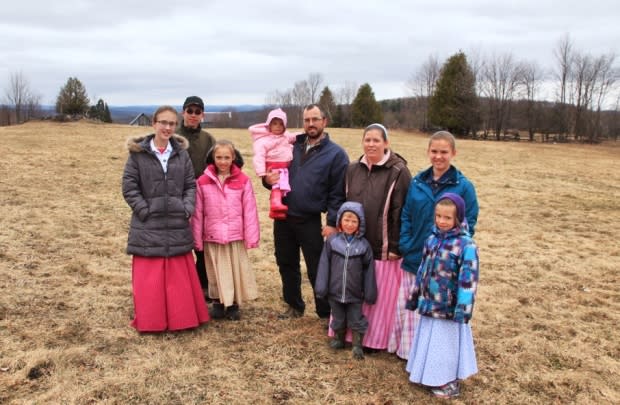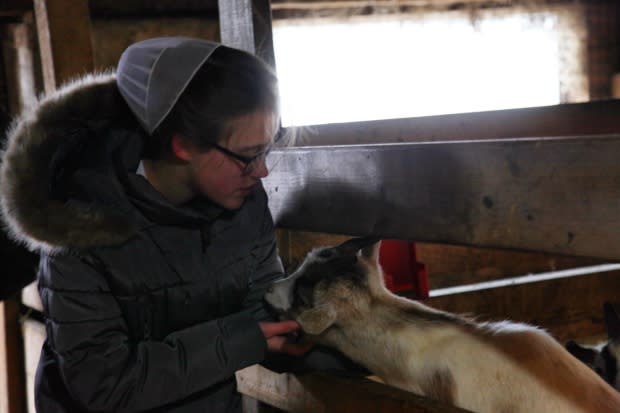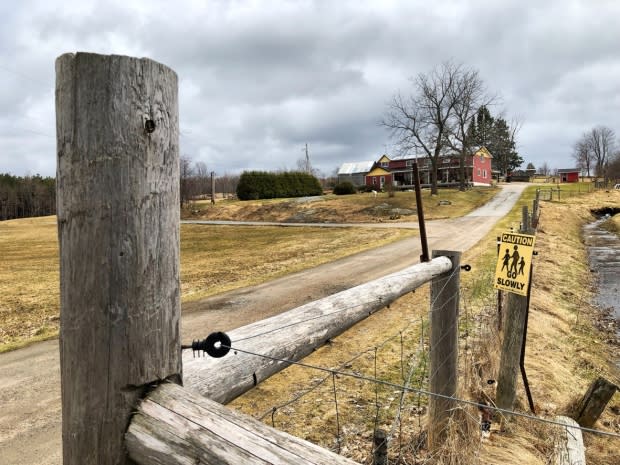Heart and home
With the easy gait of a farmer, Galen Horst strolls across the uneven field that rises up to a crest near the southern edge of his property.
From the high point of Horst's 60-hectare farm in Hardwood Lake, Ont., it's possible to see the shimmering lavender hills of the Madawaska Highlands to the north.
Horst, 38, moved his family here in 2009, but says it may as well have been 1909.
"You go back far enough and there's a certain spot [where] all you can see is the old 100-year-old farm buildings, and it's pretty easy to imagine it's 100 years ago," he said.
Horst and his wife, Patricia, 39, have watched their family grow to nine, not uncommon among the dozen or so Mennonite families who call this peaceful pocket of the province home.
"What we're really reaching for in family life and how we live life is a little bit how they did 100 years ago," Horst said, the Pennsylvania Dutch he spoke in his youth colouring his accent.
The nearest grocery story is 50 kilometres away, and the Horst children, who range in age from 18 months to 16 years, receive their schooling at home. The older ones are expected to assist either in Galen's welding shop or with the daily chores associated with raising cows, goats, pigs and chickens.
The girls' long, floral dresses are homemade and modest, and the boys' clothes are simple and sturdy, suited to life on a farm.

But unlike Old Order Mennonites, the Horsts don't eschew technology. Galen keeps a blog and relies on computer-assisted design for his welding business. An Instant Pot sits on the kitchen counter alongside a stand mixer for the daily baking.
The Mennonite congregation surrounding them is like another, larger family. Worship and other church activities take place at least twice a week. Prayer gatherings, informal home-school groups and neighbourly visits occupy the rest of their days.
It is exactly the life the Horsts were after when they came to this place.
Two years ago, as the Horsts returned from a family hike to a nearby lake, Amanda, then 12, began to feel weak. Her pace slowed and she placed a hand over her heart.
Over the following months, the teen complained of chest pains and fainted several times.
Soon there was a referral to see specialists, and five times over the next year, the family piled into the car for the two-hour pilgrimage to eastern Ontario's children's hospital in Ottawa for tests.
On March 7, doctors dropped a bombshell. Genetic testing had finally revealed the cause of Amanda's symptoms: a condition called restrictive cardiomyopathy, when heart muscle becomes too weak to effectively pump blood to the body.
Amanda needed a heart transplant as soon as possible. Without it, she would almost certainly die.
"I was speechless. I was thankful that Patricia was beside me," Galen Horst recalled.

As much as they trusted the advice of the cardiologists, the Horsts wanted to consult with the elders of their church community, too. While the Mennonite faith doesn't take any particular stance on organ donation, it doesn't oppose it. The Horsts just wanted to be sure.
"We knew the Lord had taken care of her this long, and we wanted to leave it in the Lord's hands for a few days before we take the next step in seeking treatment," Horst said.
Meanwhile, Patricia Horst was doing her best trying to explain the seriousness of her daughter's situation to the teen, making heart physiology part of the home-schooling curriculum.
"We also put it to her that nobody is granted to get old. Anyone of us could jump in a car and have an accident," she said. "Yes she has a condition and it can be terminal, but really, that goes for all of us so in that sense it's not that much different — though it does make it more real."
The family was in for more bad news when they learned the surgery couldn't be performed in Ottawa. The transplant would have to be performed at Sick Kids in Toronto, and Amanda would have to spend between six months and two years recovering there.
There was never any question: the family would go with her, leaving Hardwood Lake behind.
Amanda, now 14, is a slight, quiet girl who doesn't volunteer much information to strangers. It's not easy for her to explain how she feels about leaving the paradise her family has spent a decade building, or about her uncertain future in a strange new place.
'You feel almost trapped.' - Amanda Horst
"You feel almost trapped," she said of her last visit to Toronto. "You can't get out and you feel closed in."
She has no interest in the museums, restaurants and other urban attractions Toronto has to offer. But neither she nor her family have any choice. They're now preparing for life in Canada's largest city.
They've found a house big enough for a family of nine to rent in Markham, about a 35-kilometre GO train trip from the hospital.
A family friend has started an online fundraising campaign to help with the rent, and with the high cost of city living. Their bank has offered to adjust mortgage terms while Amanda is being treated.
They've sold off some livestock and accepted offers from friends to take in other animals including Amanda's herd of miniature goats.

Galen plans to design welding projects from Markham while an employee back in Hardwood Lake looks after the day-to-day business, but there will be a loss of income. He also plans to make the 250-kilometre trip back to Hardwood Lake each weekend to check on the wood-heated home and tend to the family's remaining animals.
Sixteen-year-old Brandon recently removed the sign that stood at the end of the driveway advertising fresh eggs for sale, knowing the henhouse will soon be empty.
As much as he can do to prepare his family for the coming upheaval, Galen Horst knows certain things are out of his hands when it comes to his daughter and the danger she's now facing.
"That's one of the things that was really difficult as a dad, to help her understand how serious it was," Horst said, gazing out at the Madawaska Highlands as if trying to record a memory to take with him. "We tried to always offer as much as we could."
There are enormous risks ahead. It will be the family's greatest test.
But they're taking it on together, with hope and faith, and know that whatever comes, this place will be waiting for them when they return.

